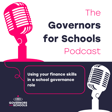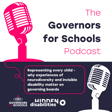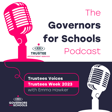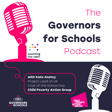Become a Creator today!Start creating today - Share your story with the world!
Start for free
00:00:00
00:00:01

How can schools manage energy consumption? - Interview with Nicola Webb, Energy Sparks
With energy costs at their highest in many years, schools across the country are struggling to manage bills. On this first ever episode of The Governors for Schools Podcast, we speak to Nicola Webb from Energy Sparks, an organisation that helps schools reduce their energy consumption and tackle climate change.
Discover more about Energy Sparks: Home | Energy Sparks
Check out our Counting the Cost campaign: https://governorsforschools.org.uk/countingthecost/
Transcript
Introduction to Governors for Schools Podcast
00:00:17
Speaker
Hello and welcome to the first ever episode of the Governors for Schools podcast. We're delighted to be launching this new venture as we launch our latest campaign, Counting the Cost, which will explore the impact of the cost of living crisis on the education sector and how governors can support schools to make the most of their budget. Counting the Cost will run throughout May and will release one episode for each week of the campaign.
00:00:44
Speaker
Once the campaign is wrapped up, you can continue to enjoy your regular podcast fix covering all things governance as we plan to keep this channel alive all year round. Watch this space for further updates about the future of the Governors for Schools podcast and remember to spread the word among your friends, colleagues and networks.
Campaign Goals: Counting the Cost
00:01:02
Speaker
So, what can you expect from counting the cost?
00:01:05
Speaker
As you're probably well aware, governors are facing tougher challenges than ever. The school budgets are squeezed and families struggle to cover some of the costs associated with pupils' education. From rising energy bills to staffing costs, the current financial situation is affecting every aspect of school life, and it's up to governors to ask the right questions during board meetings to ensure school leaders feel supported during this uniquely challenging period. This is where our campaign comes in.
00:01:35
Speaker
Over the coming weeks, we'll release a range of informative resources to help existing and prospective governors, as well as those with a passion for education, get to grips with the cost of living crisis and learn how governance can make a positive difference in young people's lives. We'll cover a different topic each week, including school estates and buildings, issues facing parents and carers, learning opportunities and extracurricular experiences, and staff-related issues.
00:02:04
Speaker
As well as podcasts, we'll be releasing video content and informative articles to develop your knowledge surrounding governance and the cost of living crisis. Don't forget to check out our campaign webpage at www.governorsforschools.org.uk. We also encourage listeners to join the discussion on our Twitter, Facebook and LinkedIn pages where we'll be posting the latest updates from the campaign.
Acknowledgements and Supporters
00:02:28
Speaker
Finally, we'd like to extend our gratitude to Alan and ovary whose generous support has helped us produce all materials for counting the cost. We look forward to engaging with you throughout the campaign. Happy listening and don't forget to subscribe to this channel wherever you get your podcasts.
Impact of Rising Energy Costs
00:02:51
Speaker
Hi everyone, I'm Leah, part of the Marketing and Communications team here at Governors for Schools. I'm delighted to be hosting the first in a series of interviews for our Counting the Cost campaign. This week we're looking at how governors can support schools with buildings and estate management throughout the cost of living crisis. As listeners are probably well aware, energy costs have shot up over the past year or so due to soaring wholesale gas prices.
00:03:19
Speaker
Despite the government's introduction of caps and grants to lower energy bills, households and organisations across the country are struggling with unprecedented inflation in energy prices. For schools, balancing the books is even trickier when energy costs are sky high.
00:03:37
Speaker
So how can school leaders mitigate energy costs by reducing consumption and boosting energy efficiency? And what are the other benefits of embedding energy efficiency in the overall school strategy? To help answer these questions, I'm delighted to be joined by Nikki Webb, Senior Energy and Carbon Consultant at Energy Education Charity Energy Sparks.
Introducing Energy Sparks: A Solution
00:04:01
Speaker
Welcome to the show.
00:04:02
Speaker
Thanks very much, Leah. And we're delighted to have you here, so let's get into it. So to start us off, can you tell me a little bit more about EnergySparks and how you help schools across the country? Of course, yeah. So EnergySparks is an organisation or it's an online energy analysis tool and an education programme for schools in the UK. So we help schools to reduce their gas and electricity use by using their smart meter data.
00:04:32
Speaker
We're a small charity, we originated in the area around Bath, and we began life as a project supported by Transition Bath. Up until now, we've had the majority of our funding from central government, and some additional funding from energy companies, from other charitable foundations, and it means that we've been able to offer our services for free to state schools, which is proving to be very important, I think, to them. Yeah, yeah.
00:05:01
Speaker
Yeah, so sorry. So at the time of recording as well, so this is we're recording this in April, we are still reviewing our options for funding and whether we'll be able to still offer it for free from September. So some areas are likely to be funded through our partners or local authorities. But we may have to start charging some schools to use the service, which is a bit of a shame.
00:05:27
Speaker
Sorry, you go. No, no, that's fine. No, that's obviously, you know, it's interesting and to give us that background.
Energy-Saving Strategies for Schools
00:05:34
Speaker
And obviously we hope that you get the funding that you need to carry on offering those services that are really important to schools, especially now. Absolutely. Yeah. And what we do, so we
00:05:47
Speaker
The service that we provide really helps our school leaders to, and actually the whole school community, to better understand their energy use. And we also introduce wider measures as well to help reduce the carbon footprint of the school. Should I tell you a bit about how we do it? Give you some ideas. Yeah, yeah, no, that bit. Yeah, they all help. Yeah.
00:06:07
Speaker
So we display energy data, the energy use data in really clear charts. So taking it from being just a bill that you pay at the end of the month to actually being able to see at what time of day anybody uses their energy. So it's really, really clearly set out with really clear recommendations as well. I previously worked in the climate emergency team for a local authority.
00:06:33
Speaker
There's a huge amount of focus on how expensive the energy transition is and how much investment we need to make to run our homes and our community buildings more efficiently. But actually, there's a huge amount that we can do and really big savings to be made by most schools and lots of other buildings as well. But just by reducing the amount of energy that's used when the school is closed. So although investment is needed, that's not the first thing that a school should do.
00:07:01
Speaker
And the other thing that's really important, which you did talk about a bit before, was involving pupils. So we have a lot of resources for students to learn about the climate crisis, about what energy is and where it comes from, and how to reduce the amount of energy that we use in our schools and our homes. And although there is staff input required to use energy sparks, in the long term, it can be really helpful having really active pupils can reduce that staff burden on energy management.
00:07:31
Speaker
You've got pupils making sure that everything's switched off at lunchtime and the end of school. And they can have some of the tricky conversations as well with caretakers and kitchen staff that can really help the school business managers and anybody else trying to do it.
00:07:46
Speaker
Yeah, absolutely. And I think, you know, it's great to involve the pupils because obviously they're the future generation as well. But also just by actually understanding how that energy consumption is actually used rather than like you said, just thinking, OK, we need more money. It's like, OK, how can we be smarter with this?
Understanding School Energy Use
00:08:06
Speaker
So I suppose it would be interesting for us all to know how many educational establishments are you currently working with right now?
00:08:15
Speaker
So understandably, in the last year with rising energy prices, we've become very popular. So this time last year, we had about 300 active schools on energy sparks, and we now have over 1,000. So check this morning, 1,017 schools. And that's across England, Scotland, and Wales. Wow. So it's grown hugely then. It really has. So I started in September with energy sparks, and we had, I think we just crossed into 400 at that point.
00:08:43
Speaker
It's a real change this year. Yeah, and it's great to see that schools are obviously using the services that you offer as well through this much needed time. So we just touched on it then about energy costs increasing over the past year. Can you tell us a bit more about probably the state of schools that they're currently in in terms of their energy usage at the moment? And are you seeing that schools are consuming excess energy?
00:09:10
Speaker
Yeah, okay. So I think it helps to get an idea of the scale of most of the cost of energy for schools as well in that. Until recently, most schools were paying about 15p per kilowatt hour for electricity and about 3p for gas. And looking at the average spend per pupil for our energy spark schools,
00:09:32
Speaker
A typical two-form entry primary school would spend between about 25 and 30,000 pounds a year, and a typical secondary school with about 1,000 pupils would spend between 80 and 1,000 pounds per year on energy. But in the last year, and certainly we've just got to the end of a financial year for local authorities, we're seeing energy prices going up by three or four times, in some cases even more than that.
00:10:02
Speaker
Yes. And I know there are lots of different units involved when you talk about energy as well. So I think talking pounds really helps because it tends to be easy to talk about, you know, everyone knows what it means rather than kilowatt hours and kilowatts and carbon dioxide savings and things like that. But at the moment, the amount spent can, because of how different schools are on different terraces, the amount spent can massively
00:10:25
Speaker
change are very different between different schools. So the numbers, I'm going to quote a couple of numbers in a minute, but the things that I'm quoting at the moment are kind of those long term average costs. Yeah, they could actually be much, much higher. So for an average school, we tend to see that more than 60% of their energy use takes place outside of school hours. So when the school is either completely empty, or has
00:10:51
Speaker
quite a small number of staff or a few pupils on site. So that could easily be £50,000 a year for most secondary schools or £15,000 to £20,000 for primary and on those new higher tariffs, much more than that. So for most schools, if we can reduce that out of hours spend or out of hours energy use down to 50% or 55%, it's
00:11:17
Speaker
that could take them thousands of pounds every year and these sorts of changes are usually completely free to do and relatively simple.
00:11:25
Speaker
Yeah it sounds like a more simple solution is kind of looking at what they're doing you know after those school hours rather than just what's in those school hours if that makes sense. Yeah absolutely. I mean we kind of touched on this just in your last answer but how significant could the cost savings be if they were just a bit smarter about their usage? So just being a bit smarter
00:11:52
Speaker
easily, so obviously it depends on the size of the school, but they can easily save sort of 10% of their energy use by being a bit smarter, you know, savings around the edges, savings when the school's closed and even more than that for some schools as well. What areas do you think that schools tend to consume the most energy?
Simple Changes for Energy Reduction
00:12:17
Speaker
Okay, so that can be quite a difficult one to answer. So I think typically
00:12:22
Speaker
When it comes to cost, the cost to split about 50-50 between gas and electricity. If you're thinking about carbon dioxide emissions, then it's skewed much more towards gas. So if you're trying to save carbon emissions, then gas is the higher part. If you're trying to save money, then it's 50-50 between the two. And for gas,
00:12:47
Speaker
Generally, it's about 60% of the gas is used for space heating, heating the rooms, and about 40% for hot water. So hot water, I think, is quite a surprising amount of the gas consumption. And then when it comes to electricity, it's more difficult to, you know, it's much more spread out. There are a lot of different things that can use electricity. So it's much more difficult to say that one thing in particular uses a lot. So
00:13:13
Speaker
You've got your lights, IT equipment, kitchen equipment, science labs for secondary schools. But there are also, I guess, quite a lot of schools now using electricity for their heating. So it is much more spread out, much more difficult. But also, there are different people that have control in these different things. So for kids, it's generally, you know, it's the caretaker, the facilities managers who can make that change. For electricity, there's a bit more
00:13:42
Speaker
power in the pupil's hands, they can switch things off. Yes, and I think as well, the things that often use a lot of electricity are things that are switched on running at all times. So fridges and freezers and IT servers can use quite a lot of that electricity if they're not very efficient.
00:14:06
Speaker
Right, OK, that's interesting. And I suppose that all kind of links back to as well, it's the size of the school and it's obviously going to have a big difference in that, isn't it? In terms of those costs, the bigger the building, the higher the costs.
00:14:21
Speaker
And what do you think? I mean, again, we have touched on this slightly. You've mentioned things that we can do out of school hours. But what would you recommend as some simple solutions to cutting energy consumption that governors can bring to board meetings?
00:14:38
Speaker
Yeah, okay. So in general, I think that the most important thing is to understand your energy consumption. So when, how much you use, how do you compare to other schools? And so trying to make sure that you have a modern smart meter that you can get decent access to energy data is really, really important. But even if you don't have that perfect access, you don't wait to have the perfect data to make changes. So
00:15:04
Speaker
some of the simple solutions. I've got a few that I've just noted down to make sure I say. So first of all, I mean, I don't know exactly when everyone's going to be listening to this, but we are in the summer term now. We've started summer term to make sure the heating is switched off. Even if you're in the very far north of the country, once the school is full of hundreds of people, it's unlikely to need much heating. So in the longer term,
00:15:31
Speaker
make sure the heating and hot water are off during weekends and holidays, just have frost protection settings and make sure that those settings are working properly as well. And then hot water, make sure the system is off. So I did say that, didn't I? Hot water off at weekends and holidays, just make sure it's flushed before the end of a long holiday so that any risk of Legionella is reduced.
00:15:57
Speaker
Right, heating. So when the heating is on, make sure that it doesn't come on too early in the mornings. So we often have a lot of schools that don't have a clue that their heating starts at one o'clock in the morning until they see their gas consumption on energy sparks. So even if you think you've got it licked, it's not always as often the systems don't work exactly how we expect them to.
00:16:21
Speaker
And I think because gas has been very cheap for a very long time, so heating engineers generally set systems up to keep the school nice and warm and nice and comfortable. They don't want complaints that their heating system is not doing what it's meant to do. So unless you have a school caretaker or facilities manager or anyone else who has specific heating systems, knowledge and are really comfortable with using that and meddling with the system,
00:16:49
Speaker
you know, they don't always feel like they can investigate further or question how things have been set up on their behalf. So making sure that you really understand the system and it's not coming on too early is really important. So on that note, controls. Controls is really, really important. So getting better boiler controls, adding timer switches to things like tierns or storage heaters so that they're not
00:17:15
Speaker
just on 24 hours a day. They can go off in the evenings or go off at weekends. And we recently had one of our schools actually who they look like they're going to save tens of thousands of pounds every year because they have installed an automatic switch off for all their networked IT equipment. So 8 p.m. every day, everything switches off. And it's such a simple solution. Incredible.
00:17:42
Speaker
Yeah of course, no I think they're all simple and quite easy things for you know for schools to implement and to do and I think that I think even
Student Involvement in Energy Initiatives
00:17:51
Speaker
you know not even just schools I think we're all guilty sometimes of not really understanding our bills or where we're even you know where we can make those cost savings because I think sometimes it's just habit isn't it?
00:18:05
Speaker
So with that, you've talked about obviously understanding the energy consumption, but how easy is it to get that visibility? In terms of your meters, do you mean? Yeah, how easy would it be for schools to get those? So for most school, sometimes they would need to upgrade their smart meter or their meter to be upgraded to be a smart meter.
00:18:34
Speaker
And in some circumstances as well, the billing is slightly more expensive to be able to get full access to their data. Something like £100 a year to get better access to your data. But when you think about the thousands of pounds that you could save, it's a very good idea to do it. The other thing as well to get a better idea of what you're using is those plug-in appliance monitors
00:19:04
Speaker
So they're very cheap to buy again. So from DIY shops or anything about 15 pounds, you plug it into your fridges, your IT equipment or any other appliances. If you leave those plugged in for a day or a week, work out how much each of those things are costing you over a whole year. And it might be that you find there are some things that use a lot more electricity than you thought. And we've got some really lovely case studies on our website from schools that have
00:19:33
Speaker
upgraded servers or fridges and saved hundreds of pounds a year on those changes. No, that's great because I think some people wouldn't necessarily know about those. And I think that again, for the governors going into board meetings, they're great things to be able to recommend to the board. So that's great. And beyond any cost saving benefits, why do you think schools should get involved with energy saving initiatives?
00:19:58
Speaker
Well, I mean, we are we're absolutely at a crunch time now for carbon emissions. So loads of councils, hundreds of councils across the country have net zero plans. So does the Church of England, many multi-academy trusts and the schools themselves all have these really sort of strict and tight deadlines, but not necessarily the funding behind it to do that.
00:20:24
Speaker
So nationally, internationally, we know we have to cut emissions dramatically. We have to cut them quickly. And we can't simply, I think there's so often we sort of wait for this perfect plan or this huge investment to be able to make those differences. But we can really make a lot of them, you know, quite quickly, quite simply straight away. I think using something like Energy Sparks,
00:20:49
Speaker
shows the school community that the school is taking action, that they're taking it really seriously and that climate change is a priority for the school. Children know about climate change. They want to learn about it in school and many are deeply worried about their future. So if schools aren't seen to be taking action, it can really add to that feeling of anxiety. And having schools at the heart of our communities
00:21:18
Speaker
If we're improving the knowledge and the abilities of our school staff and our students to act on climate change, as well as saving ourselves lots of money, it's incredibly valuable that it can take that back, take that home and hopefully do more for themselves as well. And then on a completely different note to that,
00:21:38
Speaker
I think it's a really valuable way of learning about your subjects in a much more applied way. So using doing maths and science, using real life examples, having real life impacts is really valuable. So having real relevant data like the school's energy data can be it can be really easily included in maths and science lessons and really engage those pupils, promote those those projects and conversations about energy
00:22:04
Speaker
efficiency and giving their personal responsibility. We do also offer lessons that meet national curriculum requirements, so they should slot relatively easily into science, geography, maths, as well as having that extension into other subjects like English. I don't know about you, but the things that really stick in my head from school are the ones that I actually
00:22:29
Speaker
can physically see and understand and apply to real life. So I just always imagine a 10 or 11-year-old using a graph to identify saving thousands of pounds or tons of carbon. It would be incredible. Yeah. Yeah, definitely. And I think there's also quite a lot of other skills that are not necessarily curriculum based. So there's sort of leadership skills and project management, confidence building, really very useful
00:22:59
Speaker
useful skills in there. And also don't forget that we've got the DFE now requires all schools in England to have a sustainability lead by 2025. So having something like EngiSpark starting schools on that kind of sustainability journey can be very helpful.
00:23:17
Speaker
Yeah, no, yeah, that's really interesting. And obviously, you know, we've spoken a little bit about how we, you know, involve children and pupils into like real life examples in terms of understanding energy saving initiatives and everything to do with climate change. But do you think there's anything else additionally we could do to encourage children in that?
00:23:41
Speaker
So I think it's really important to show children and young people, and actually people of any age, I suppose, that you can really make a difference to the world around you. So when it comes to climate change, I think a lot of people feel completely powerless. What difference can little old me make? What can my choices do? I'm just one person, you know,
00:24:02
Speaker
There's a real feeling of anxiety and I'm sure you felt that at times, I definitely have. Yes, definitely. So just imagine if one person in that school
00:24:13
Speaker
starts a school, an eco group, a school council or something, and they find some savings for their school and realise that they can make these changes. And they're actually part of a community of over 1000 other schools doing the exact same thing. It feels like this is real change that we're making. Yeah. And so we did a bit of a comparison exercise recently looking at
00:24:35
Speaker
the energy consumption during autumn term. So the term we've just had and then compared it with the previous one. So we had about 360 schools with enough data to do that full comparison of the two terms. And of those, 74% of them reduced their total energy consumption. And it was a total saving of over 5 million kilowatt hours
00:25:00
Speaker
of energy and more than 900 tonnes. So that's just in a four month period that happened. Oh my goodness. Wow. That feeling of yes, I've done a thing. I've really made that difference is incredible. So children want to do what's right. They want to do what's fair. They're concerned about climate change.
00:25:19
Speaker
and being able to see it I think as well that's the other thing about energy sparks is you can see it really really quickly. So I've worked in reporting admissions for many years and nationally and internationally it takes a good two years to see the impact of any policy change in the numbers. For energy spark schools it's days so if you do switch off
00:25:41
Speaker
I switch everything off on a Wednesday afternoon.
Guidance for Governors on Energy Efficiency
00:25:43
Speaker
By the next Wednesday, you'll have all of that data. You'll be able to see the impact of exactly what you've done. Oh, excuse me. No, that's okay. So yeah, I think that's one of those really powerful things. The other thing that we have is the pupil dashboard. So we have an adult version of EngiSparkz and we have a pupil version. Yeah.
00:26:04
Speaker
And the pupil one has additional equivalences, so it gives you a comparison of how many trees would you need to plant to offset your emissions, how many miles you'd have to drive to produce the same amount of carbon dioxide, or how many months of back-to-back computer gaming their school's electricity consumption could power.
00:26:25
Speaker
most young people or actually probably adults for that matter have absolutely no idea how much school spends on energy and you know providing those sorts of comparisons can be mind-blowing I think to see how much their school is spending on energy and how much they're using. Yes I think the final thing I was going to say as well was competitions so we do we do run competitions which is always nice I think
00:26:50
Speaker
Sometimes it's for the adults more than the pupils as well, seeing that we've got a few schools that have very healthy competitions between one or two schools in the same academy trust that want to be doing better. So when pupils log activities, then they earn points that at the end of the year, the schools with the highest points will earn money towards energy efficiency improvements. We've also got
00:27:14
Speaker
a little hamper of goodies of sort of energy monitors and some climate related books and things like that that is going to go to the school with the biggest energy saving over the Easter holidays. So things like that I think are always pretty exciting.
00:27:29
Speaker
Yeah, I think that's a wonderful idea, getting everyone a little bit of healthy competition does no harm. And I think, like you said, I think it's really important when children and young people actually get to see the impact of what they're doing and the change that that's making. I think that they can only encourage them more. Absolutely.
00:27:50
Speaker
OK, so in going back to sort of the board meetings with governors and schools, what questions do you think school governors could be asking school leaders about their energy consumption? Right, excellent question. So if schools in England, I think it'd be really important to find out what the school has spent or is planning to spend their DFE additional capital funding on. So that was
00:28:18
Speaker
and an allocation of funding in December 2022 they were given towards energy efficiency improvements. But it wasn't ring fenced to energy efficiency. So we ran some training sessions in the last few months about what the best investments for that money were. And there's a blog post on our website about that as well. So that's a really good question to ask. And if you're not in England, if you're in Wales or Scotland, there are also the Salix energy efficiency
00:28:47
Speaker
grants that they can grant loans that they can get as well. And they'd all be through the local authority. So I think for schools in England and Scotland, I think it's a good idea to work as closely as possible with the local authorities to see how can the school support on the net zero plans they've got, how can the local authorities support the school and working together on those. I think other things to ask about is
00:29:14
Speaker
getting, make sure that you understand, you know, do you know how much the school is spending on energy? And also how much time is being spent trying to reduce those costs? Is there someone who has clear responsibility for energy saving? Is it in a job description? And therefore, you know, performance reviews are related to it. Talking about responsibilities, also there are critical times of the year. So end of school term, particularly end of summer term,
00:29:43
Speaker
Is there someone whose job it is to switch everything off? Or is there someone who's working on one area of the school? Is there a name and a responsibility to do those things? And if you have getting the boiler set up at the beginning of the winter, whose responsibility is that to do? Who understands it? Do they actually need some training?
00:30:07
Speaker
and to get better understanding and a better grasp on the controls as well. I think that's quite important. Yeah. Oh, other questions. Policies as well, I think. Yeah. So do you have long term policies, plans, decarbonisation plans for your school? Excuse me. Do you look at energy consumption when you purchase new appliances? So it's not just the cost of of buying something, it's the cost of then
00:30:35
Speaker
powering it for the next few years.
00:30:39
Speaker
So that's probably quite a lot of questions for them to be asking. Yeah, no, they're all great points that they can bring to the table because I think sometimes it is knowing what to ask and what to look out for. And I think, you know, because this is an issue that we've kind of not had to think about for or just hasn't been thought about in a long time, talking about bills going up and etc. It's now that we're in a position where all of a sudden it is so high and it's become a huge problem.
00:31:06
Speaker
it's quite hard sometimes to know what are the right questions to be asking or how can we come up with a strategy to help us, to help us reduce those costs and those carbon emissions. So, no, I think those are really good points. And also just kind of what you said about smart meters and things like that, the little things that might, you know, might be a cost to invest in,
00:31:29
Speaker
straight away, but if it's going to send you, if it's going to save you money in the long term, it might be worth investing in. Yeah, absolutely. So if a school is re-procuring their energy contract, chances are if they see this little itemised £100 for this meter, they might choose to not get that bit. Yeah, and it can make a really big difference to what they can see and what they can do about it.
00:31:56
Speaker
Great, thank you. And just my last question is how can listeners discover more about your organization? Oh, lovely question. So have a look at our website.
00:32:07
Speaker
So it's energy sparks, ooh, energy sparks dot UK. I don't often have to quote my own website. Yeah, energy sparks dot UK. Have a look on the website. All of our data is open data so you can look at a school. So if there's a school near you that you want to look at that's a bit like your school or something like that.
00:32:29
Speaker
You can have a look at other schools' data. On our main web page, there is an enrol form. So although at the moment we don't have funding to take on new schools, there is a waiting list. So if you pop your name on that, you will be on the waiting list. And it could be that by the time this goes out, there might not be a waiting list anymore and you won't be able to get a straight answer. So do put your name down on there.
Episode Wrap-up and Next Week's Preview
00:32:54
Speaker
And there's also on our website, there are lots of case studies as well, so they can show you some examples of what schools have done and how much they've saved by doing that.
00:33:06
Speaker
OK, brilliant. Thank you so much for all your advice and joining me today, Nikki. I'm sure all of our listeners have found this interview informative and will use your insights for future board meetings. We wish you and Energy Sparks all the best in your mission to make our schools more energy efficient. Remember, by implementing energy saving measures in schools, we not only save money, but contribute to a more sustainable future for all.
00:33:32
Speaker
We encourage listeners to check out Energy Sparks, links which can be found in the show notes and on our campaign resources page at www.governors4schools.org.uk. There you'll also find links to our campaign articles, video content and helpful resources about how governors can weather the cost of the cost of living, can weather the cost of the cost of living crisis.
00:33:54
Speaker
Many thanks to Alan and Ovary for kindly sponsoring Counting the Cost and making it possible for the production of our campaign materials. Next week we'll be looking at how the cost of living crisis is affecting parents, carers and families and how governors can help leaders support disadvantaged pupils through this difficult period. Bye for now and remember to subscribe to our channel to keep enjoying governance related podcaster content. Thank you.












